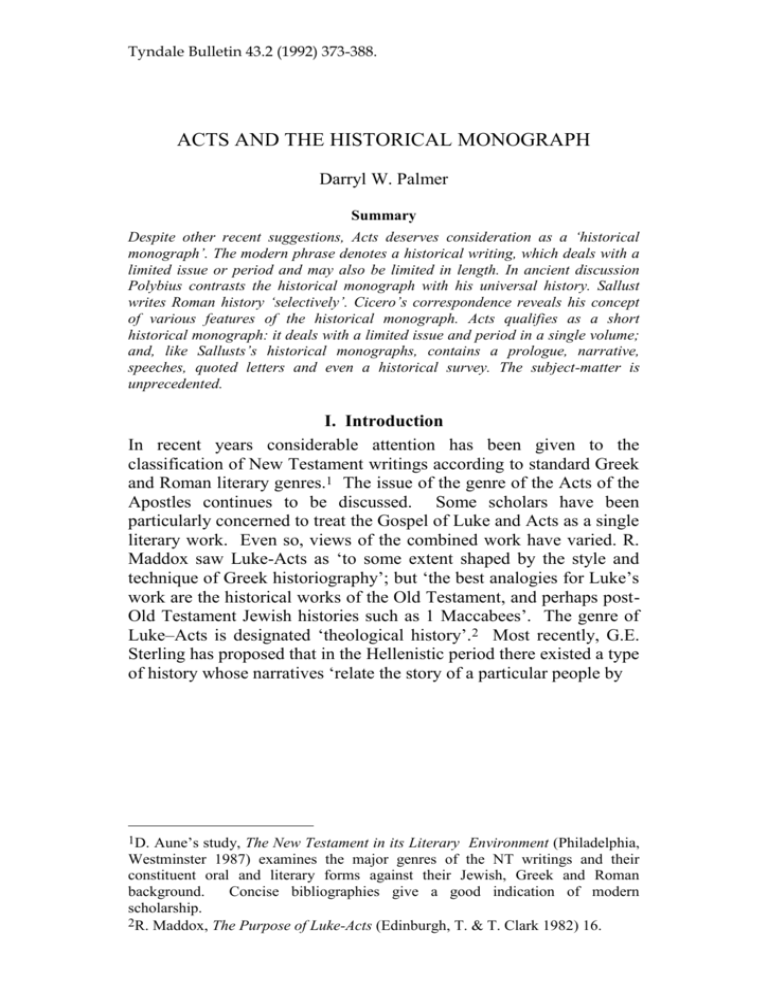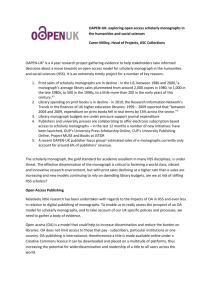ACTS AND THE HISTORICAL MONOGRAPH
advertisement

Tyndale Bulletin 43.2 (1992) 373-388. ACTS AND THE HISTORICAL MONOGRAPH Darryl W. Palmer Summary Despite other recent suggestions, Acts deserves consideration as a ‘historical monograph’. The modern phrase denotes a historical writing, which deals with a limited issue or period and may also be limited in length. In ancient discussion Polybius contrasts the historical monograph with his universal history. Sallust writes Roman history ‘selectively’. Cicero’s correspondence reveals his concept of various features of the historical monograph. Acts qualifies as a short historical monograph: it deals with a limited issue and period in a single volume; and, like Sallusts’s historical monographs, contains a prologue, narrative, speeches, quoted letters and even a historical survey. The subject-matter is unprecedented. I. Introduction In recent years considerable attention has been given to the classification of New Testament writings according to standard Greek and Roman literary genres.1 The issue of the genre of the Acts of the Apostles continues to be discussed. Some scholars have been particularly concerned to treat the Gospel of Luke and Acts as a single literary work. Even so, views of the combined work have varied. R. Maddox saw Luke-Acts as ‘to some extent shaped by the style and technique of Greek historiography’; but ‘the best analogies for Luke’s work are the historical works of the Old Testament, and perhaps postOld Testament Jewish histories such as 1 Maccabees’. The genre of Luke–Acts is designated ‘theological history’.2 Most recently, G.E. Sterling has proposed that in the Hellenistic period there existed a type of history whose narratives ‘relate the story of a particular people by 1D. Aune’s study, The New Testament in its Literary Environment (Philadelphia, Westminster 1987) examines the major genres of the NT writings and their constituent oral and literary forms against their Jewish, Greek and Roman background. Concise bibliographies give a good indication of modern scholarship. 2R. Maddox, The Purpose of Luke-Acts (Edinburgh, T. & T. Clark 1982) 16. 374 TYNDALE BULLETIN 43.2 (1992) deliberately hellenising their native traditions’. According to Sterling: ‘This is precisely what Luke–Acts does.’ And for the genre he uses the term ‘apologetic historiography’.3 L.C.A. Alexander’s investigation of the Lucan prefaces led her to understand Luke–Acts against the background of technical treatises. She sees ‘Luke as a writer set firmly within the context of the scientific tradition. . .The scientific tradition provides the matrix within which we can explore both the social and literary aspects of Luke’s work, both the man himself and the nature of his writings.’4 C.H. Talbert interpreted Luke-Acts as a mixture of two sub–types of Graeco–Roman biography.5 However, biography has more usually been considered as an appropriate genre for the Gospel of Luke along with other gospels, and apart from Acts. It is only because Aune is not willing to separate Luke from Acts, that he cannot accept Luke as a biography. 6 But it seems better to allow ‘that Luke and Acts are themselves different in type, even when we grant their essential unity and continuity’. 7 Acts, when considered separately from Luke, has most commonly been regarded as a historical writing.8 And, in particular, several recent 3G.E. Sterling, Historiography and Self-Definition. Josephos, Luke-Acts and Apologetic Historiography (Leiden, Brill 1992) 374. 4L.C.A. Alexander, ‘Luke’s preface in the context of Greek preface-writing’, NovT 28 (1986) 48-74 at 70. Cf. her Oxford D.Phil. thesis, ‘Luke Acts in its contemporary setting, with special reference to the prefaces (Lk. 1.1-4 and Acts 1.1)’. For criticisms, see S.E. Porter, ‘Thucydides 1.22.1 and speeches in Acts: is there a Thucydidean view?’ NovT 32 (1990) 121-42 at 125-6; Sterling, op. cit., 340. 5C.H. Talbert, What is a Gospel? The Genre of the Canonical Gospels (Philadelphia, Fortress 1977) 134. For criticisms, see Aune, op. cit., 79; Sterling, op. cit., 319-20. 6‘By itself, Luke could (like Mark, Matthew and John) be classified as a type of ancient biography. But Luke. . .was subordinated to a larger literary structure. Luke does not belong to a type of ancient biography for it belongs with Acts, and Acts cannot be forced into a biographical mold.’ Aune, op. cit., 77. 7C.J. Hemer, The Book of Acts in the Setting of Hellenistic History (Tübingen, J.C.B. Mohr [Paul Siebeck] 1989) 33. Cf. Aune, op. cit., 77: ‘Luke is commonly regarded as a “gospel” because of obvious similarities to the other Gospels, and Acts is widely categorized as “history”,. . .’ 8So Sterling, op. cit., 317-8 with refs. in nn. 36-7. PALMER: Acts and the Historical Monograph 375 scholars have canvassed the category of historical monograph.9 One other view must also be acknowledged. R. Pervo has emphasised the entertaining dimension of the adventurous episodes of Acts.10 His study caused him to class Acts among the historical novels of antiquity.11 His discussion deserves a more extensive response than can be attempted here. In brief, it is hardly possible to distinguish history, and particularly the historical monograph, from the novel on the basis of the entertainment value of the two genres. As Gabba has said in the context of his treatment of historical monographs, biographies and anthologies: ‘in the same climate of paradoxographical literature the “novel” is born and develops; the novel in antiquity is in fact a form of history.’12 II. The Term ‘Historical Monograph’ The phrase ‘historical monograph’ is a modern one with some basis in ancient terminology. In modern discussion the phrase is commonly applied to historical writings which deal with a limited issue or period without regard to the length of the books themselves. Thus ‘Sallust’s first two works’ have been described as ‘monographs concerned with limited themes of special interest’.13 Again, the task of the potential writer of a historical monograph has been expressed as ‘the 9H. Conzelmann, Acts of the Apostles (Philadelphia, Fortress 1987; 1st German ed. 1963) xl; E. Plümacher, ‘Die Apostelgeschichte als historische Monographie’, in Les Actes des Apôtres. Traditions, rédaction, théologie, J. Kremer (ed.), (Gembloux, Duculot 1979) 457-66; idem, ‘Neues Testament und hellenistische Form. Zur literarischen Gattung der lukanischen Schriften’, Theologia Viatorum 14 (1977-78) 109-23; M. Hengel, Acts and the History of Earliest Christianity (London, SCM 1979) 14, 36; G. Schneider, Die Apostelgeschichte (2 vols; Freiburg, Herder 1980-82) 1.123. 10R. Pervo, Profit with Delight. The Literary Genre of the Acts of the Apostles (Philadelphia, Fortress 1987) 11. 11Pervo, op. cit., 137-8. 12E. Gabba, ‘Literature’, Ch. 1 in Sources for Ancient History, M. Crawford (ed.), (Cambridge, University Press 1983) 15. For brief criticisms of Pervo, see Aune, op. cit., 80; Sterling, op. cit., 320. 13F.R.D. Goodyear, ‘Sallust’, in The Cambridge History of Classical Literature, Vol. 2: Latin Literature, E.J. Kenney with W.V. Clausen (eds.), (Cambridge, University Press 1982) 268-80 at 268. 376 TYNDALE BULLETIN 43.2 (1992) interpretation of a special period’.14 Such a concept, when applied to the available evidence, means that ‘Thucydides of Athens. . .is the historian of the Peloponnesian War and therefore the creator of the historical monograph’.15 However, there seems to be some discrepancy between this strict use of the phrase in written scholarship on the one hand, and common parlance on the other. In modern oral tradition, it is not usual to speak of the eight books of Thucydides’s incomplete work as a monograph. Conversely, Sallust’s Bellum Catilinae and Bellum Iugurthinum are frequently referred to as monographs in order to distinguish them from the fragments of his Histories in at least five books.16 But even here, the issues of length and scope become somewhat confused. Sallust’s monograph on the Jugurthine war deals with the years 118 to 105 B.C. with some sketching of earlier background. The extant fragments of the Histories cover only the period 78 to 67 B.C., although some scholars postulate that Sallust intended to carry his treatment further.17 Sallust is recognised as the first Roman historian to use the form of the monograph, since it was introduced to Latin historiography by Coelius Antipater after 121 B.C.18 But Coelius wrote on the Second Punic War (218–201 B.C.) in seven books. McDonald, ‘The Roman Historians’, in Fifty Years of Classical Scholarship , M. Platnauer (ed.), (Oxford, Blackwell 1954) 391. 15H. Bengtson, Introduction to Ancient History (Berkeley, University of California Press 1970) 90. Cf. C.W. Fornara, The Nature of History in Ancient Greece and Rome (Berkeley, University of California Press 1983) 32: ‘The war monograph implicit in Herodotus emerged perfected at Thucydides’ hands’. A. Momigliano (‘Greek historiography’, History and Theory 17 [1978] 1-28 at 1011) also refers to ‘the Thucydidean monograph’. Cf. also Dionysius of Halicarnassus, On Thucydides 6-7. 16E.g., McDonald, op. cit., 391; Fornara, op. cit., 67; A.J. Woodman, Rhetoric in Classical Historiography (Sydney, Croom Helm 1988) 117; so also W. Steidle, Sallusts Historische Monographien (Wiesbaden, Steiner 1958), as in his title. 17Syme proposes 51 or 50 BC, but is not enthusiastic about Bonnet’s suggestion of 40 BC; see R. Syme, Sallust (Berkeley, University of California Press 1964) 192, n. 54. Cf. Woodman, op. cit., 117. W. Allen, Jr. drew attention to ‘a confusion in the modern usage of the word “monograph”’ in his article, ‘The unity of the Sallustian corpus’, CJ 61 (1966) 268-9 at 269 n. 5. 18See McDonald, op. cit., 391; Steidle, op. cit., 1; AD Leeman, Orationis Ratio (Amsterdam, Hakkert 1963) 74; Bengtson, op. cit., 94. 14A.H. PALMER: Acts and the Historical Monograph 377 The use of the term ‘historical monograph’ to designate historical writings of limited length as well as scope is not only present at the oral level of scholarly communication. It is also sometimes reflected in the written comments of experts. Goodyear allows that Sallust may be criticised, ‘in his Catiline at least, for the disproportionate bulk of introductory matter in a comparatively short composition’.19 Paul remarks on ‘an apparently puzzling feature of the monograph. In a work dealing ostensibly with the conspiracy, the amount of space allotted to the speeches of Caesar and Cato, and the comparison between them, may seem excessive; is the internal balance of the work not thereby endangered?’20 Or as Syme with characteristic succinctness put it: ‘a monograph, demanding concentration, entailed omissions’.21 In the narrower sense, a monograph consists of a single book or volume. However, a single volume may not always have been contained in one scroll. Sallust’s monographs each comprise a single volume, but one is nearly twice the length of the other. The Gospel of Luke and Acts are each close to the normal maximum length for a Greek scroll. Sallust’s Bellum Catilinae would have fitted comfortably on one scroll; but the Bellum Iugurthinum, being too long for a single scroll, would probably have been accommodated on two scrolls shorter than the average length.22 III. Polybius’s Views In ancient discussion, Polybius (second century B.C.) firmly distinguished his own ‘universal’ history from the ‘monographs’ of other historians. In this polemical context he did not maintain a consistent concept of universal history.23 And his remarks about monographs bear different emphases in various passages. In designating the monograph Polybius uses the phrases ἐπὶ μέρους or, more often, κατὰ μέρος (literally, ‘in part’) in a range of grammatical 19Goodyear, op. cit., 270. 20G.M. Paul, ‘Sallust’, in Latin Historians, T.A. Dorey (ed.), (New York, Basic Books 1966) 85-113 at 94. 21Syme, op. cit., 69. 22See F.G. Kenyon, Books and Readers in Ancient Greece and Rome (2nd ed.; Oxford, Clarendon 1951). 23K. Sacks, Polybius on the Writing of History (Berkeley, University of California Press 1981) Ch. 3, ‘The Genre: Universal History’. 378 TYNDALE BULLETIN 43.2 (1992) constructions. The latter phrase also has other uses in Polybius (‘in particular’; ‘in detail’). Conversely, the phrases are not yet used in Herodotus or Thucydides with reference to the historical monograph. The phrase ἐπὶ μέρους is used only twice in Polybius. In both occurrences it is used adjectivally (between article and noun) in connection with ‘particular histories’. In 3.31–32 Polybius has a historiographical digression, of which at least part belongs to a second edition. The closing phrase of this passage refers to ‘particular compositions’ (τῶν ἐπὶ μέρους συντάξεων, 3.32.10), by which Polybius means historical writings concerned with particular wars (πολέμους, 3.32.8). His own work now stands complete at forty books (3.32.2); but the particular histories, about which he complains, are many times as long (πολλαπλασίους, 3.32.4). Thus, according to Polybius, a ‘monograph’ may be much longer than a ‘universal history’. Within a short historiographical digression at 7.7.6–8 Polybius mentions ‘those who describe particular actions’ (οἱ τὰς ἐπὶ μέρους γράφοντες πράξεις, 7.7.6). These writers, he claims, both expand their subjects (7.7.1) and inflate their importance (7.7.6). The accounts of the fall of Hieronymus (7.7.1), taken as examples, are multi–volume monographs (τὰς βύβλους, 7.7.7). The majority of occurrences of the phrase κατὰ μέρος, when used to denote particular histories, is adjectival. The phrase may qualify either the subject–matter of history or the historical writing itself. There is reference, on the one hand, to wars (πόλεμοι, 1.4.3) or actions (πράξεις, 1.4.3; 9.44.2; 16.14.1); and on the other hand, to history (ἱστορία, 1.4.7,10; 8.2.2 pl.) or compositions (συντάξεις, 8.2.5). The several examples of the phrase in 1.4 occur within Polybius’s historiographical introduction to his whole work (1.1– 4). In this section Polybius indicates his own reasons for undertaking his task, including the claim that none of his contemporaries has written a universal history (1.4.2). But only by so doing can one gain a synoptic view of the whole and the interrelation of its parts—something which is not possible on the basis of particular histories (1.4.6,7, 10– 11). Polybius himself does not mention the names of any authors of particular histories in 1.4; 8.1– 2; or the fragmentary 9.44. At 16.14 he begins a digression criticising the ‘particular’ historians Zeno and PALMER: Acts and the Historical Monograph 379 Antisthenes of Rhodes. Zeno probably wrote in 15 books; the scope and length of Antisthenes’s work are unknown.24 In two contexts which have already been considered, Polybius also uses the phrase κατὰ μέρος adverbially. Literally, he refers to ‘those particularly writing histories’ (τῶν κατὰ μέρος γραφόντων τὰς ἱστορίας 1.4–6) and ‘the compositions of those writing particularly’ (τὰς τῶν κατὰ μέρος γραφόντων συντάξεις, 3.32.3). In both cases, a paraphrase referring to ‘particular histories’ is desirable in English. On one occasion Polybius constructs a noun phrase denoting ‘the composition of particular (histories)’ (τῆς τῶν κατὰ μέρος συντάξεως, 8.2.11). Here, at the end of the introduction to Book 8, the phrase is strongly contrasted with ‘universal and general history’ (τῆς καθολικῆς καὶ κοινῆς ἱστορίας). In another historiographical digression at 29.12, Polybius repeats his criticisms of ‘particular’ historians on the grounds that they expand their treatment and exaggerate the importance of their subjects (cf. 7.7). In this context the monograph is indicated by reference to its ‘single and unitary subject–matter’ (ἁπλᾶς καὶ μονοειδεῖς. . . ὑποθέσεις, 29.12.2).25 Since Polybius complains about ‘the multitude of the books’ (τῷ πλήθει τῶν βύβλων), it is clear that he envisages multi–volume monographs as at 3.32 and 7.7. Polybius had previously used the term ‘unitary’ in the historiographical introduction to Book 9. There, however, it designates the unitary nature of his own universal history (9.1.2). For, unlike nearly all other writers, who deal with every branch (μέρος) of history, Polybius avoids not only mythology but also accounts of colonisation, foundation of cities and family relationships; instead, he concentrates solely on ‘the actions of nations, cities and rulers’ (τὰς πράξεις τῶν ἐθνῶν καὶ πόλεων καὶ δυναστῶν, 9.1.4).26 In summary, Polybius frequently distinguishes between universal history and particular history or monograph. 24See F.W. Walbank, A Historical Commentary on Polybius (3 vols.; Oxford, Clarendon 1957-79), 2.517-8. 25The terms ἁπλοῦς and μονοειδὴς seem to be largely synonymous, and the expression therefore pleonastic. Their combination may have been idiomatic (as in ‘times and seasons’); cf. 6.10.6. 26The only other occurrence of μονοειδὴς in Polybius is at 6.10.6, where he mentions that Lycurgus did not make his constitution ‘single nor unitary’. 380 TYNDALE BULLETIN 43.2 (1992) Monographs deal with a particular issue within a limited period. However, they may adopt a wider perspective and are generally even longer than Polybius’s universal history. IV. Sallust’s Theory and Practice After a political and military career of mixed success and failure, Sallust (c.86– c.35 B.C.) resolved that the rest of his life should be spent far from public affairs (Cat. 4.1). More specifically, he says, ‘I decided to write an account of the actions of the Roman people selectively, as each (topic) seemed worthy of record’.27 The reference to ‘actions’ (res gestae) corresponds to the Greek πράξεις, and became standard in Latin historiography.28 The motif of what is worthy of record is also traditional.29 If the term ‘selectively’ (carptim) alludes to the monograph, that would follow the pattern of Polybius’s discussions. The term is indeed frequently understood in this sense.30 Ramsey, for example, explains the term as meaning ‘in monographs or separate essays on a limited period rather than a continuous history of R. from the foundation’.31 And Woodman actually paraphrases Sallust’s Latin: ‘I decided to write an historical monograph on a Roman theme’.32 There are difficulties in the interpretation of this Sallustian passage in addition to, but not unconnected with, the significance of carptim. In the prologues of both his monographs Sallust develops a scheme of ability, excellence, achievement and glory. The scheme is applicable not only to mankind 27statui res gestas populi Romani carptim, ut quaeque memoria digna uidebantur, perscribere, Cat. 4.2. quaeque (n.pl.) suggests ‘each group (of events)’. 28E.g., Asel. Hist. 1; Hirt. Gal. 8. pr.2; Caes. Civ. 2.32.5; 3.106.3; Sal. Hist. 1.1; Liv. pr.1. 29Th. 1.1.1. (ἀξιολογώτατος); X. HG 4.8.1. (ἀξιομηνμόνευτος); Plb. 1.2.1 (ἐλλογιμὼτατος), 2 (τῆς παραβολῆς ἄξιος καὶ συγκρίσεως); D.S. 1.6.1. (ἀκοτῆς ἄξιος); 1.3.6 (εἰς μνήμην παραδεδομένος). 30E.g., P. McGushin, C. Sallustius Crispus Bellum Catilinae. A Commentary (Leiden, Brill 1977) 9, 55; Steidle, op. cit., 1; cf. Goodyear, op. cit., 273. 31J.T. Ramsey (ed.), Sallust’s ‘Bellum Catilinae’ (Chico, Scholars Press 1984) 68. Cf. Syme, op. cit., 56: ‘Sallust announces that he will take certain portions of Roman history, selectively,. . .’ 32Woodman, op. cit., 73. PALMER: Acts and the Historical Monograph 381 in general as distinct from the animals, but also to historians in particular as well as to men of action. Sallust uses the idiomatic phrase res gestae only in the prologues (twice in each monograph) and once in the early digression outlining the previous history of Rome in Bellum Catilinae 5.9–13.5.33 In Bellum Catilinae 3.2 Sallust anticipates 4.2 by speaking of the difficulty of the historian’s task in writing an account of ‘actions’ (arduom uidetur res gestas scribere). In Bellum Catilinae 8.2 he acknowledges the impressive and magnificent nature of the ‘actions’ of the Athenians (Atheniensium res gestae). The phrase memoria rerum gestarum is used twice in Bellum Jugurthinum 4, but in slightly different senses in each occurrence. The ‘recording’ of actions is particularly useful (Jug. 4.1); while the ‘memory’ of actions kindled in the hearts of outstanding men a flame which was not extinguished until their excellence equalled the fame and glory of their ancestors (Jug. 4.6). These instances of the phrase res gestae have just been translated in a neutral way as ‘actions’. But the Sallustian contexts suggest rather the more positive significance of ‘achievements’. This point should be kept in mind when the sequence of thought in Bellum Catilinae 4.2–3 is considered. ‘I decided to write an account of the actions (achievements) of the Roman people, selectively. . .Therefore I shall briefly describe the conspiracy of Catiline as truthfully as I can. . .’ However, the conspiracy of Catiline is not an ‘achievement’ of the Roman people in the sense that Sallust has established for res gestae. Rather, as Sallust immediately proceeds to say, it is a deed, or even misdeed, which is especially memorable by reason of the unprecedented nature of the crime and the threat.34 Nor does Sallust go on to write a series of ‘selective’ monographs: only the Bellum Jugurthinum, then the Histories. And for the topic of his second monograph, Sallust goes backwards in time. Moreover, despite the similarity of the prologues of the two monographs, there is no equivalent of carptim in the Bellum Jugurthinum. On the other hand, despite the relatively short 33res in Africa gestas (Jug. 30.1) is not quite the same idiom. 34nam id facinus in primis ego memorabile existumo sceleris atque periculi nouitate, Cat. 4.4. The pejorative sense of facinus is usual in Sallust, when the term lacks a descriptive adjective; see Ramsey, op. cit., 63, 69 (on 2.9; 4.4). 382 TYNDALE BULLETIN 43.2 (1992) digressions at Bellum Jugurthinum 17–19 (geographical) and 41–42 (political), there is in that writing nothing of the scope or length of the so–called archaeology and the central digression of the Bellum Catilinae. It is in general remarkable how much of the material of the Bellum Catilinae is not actually narrative of the conspiracy. And in particular, if this writing is intended to focus selectively on the limited period of the conspiracy itself, it is noticeable that the outline of the earlier history of Rome occupies some eight chapters (Cat. 5.9–13.5) and is continued by the political digression at Bellum Catilinae 36.4– 39.5.35 Sallust is fond of adverbs ending with –im, an archaising feature. In extant Latin literature, carptim first occurs at Bellum Catilinae 4.2; and it is used only here in Sallust’s extant writings. Its position in the word order of this sentence is emphatic. McGushin claims that the term is employed ‘in the same sense as is used by Pliny, Ep. 8.4.7; Tactitus [sic], Histories 4.46.4’.36 But neither these nor the other classical examples are much help in elucidating Sallust’s meaning. Tacitus refers to people who were ‘dismissed for a fault, but separately (carptim) and individually’. Pliny uses the adverb almost as a noun, to refer to ‘selections’ from a draft history of the Dacian war. Closer to Sallust’s usage is Plin. Paneg. 25.1: ‘. . .it would be more respectful to leave things unspoken and implicit in our hearts, than to run through (the emperor’s actions) selectively and briefly’ (carptim breuiterque). The last quotation at least involves a selection of historical events to be included in a literary composition.37 According to some scholars, Sallust understood the Catilinarian conspiracy as symptomatic of the decline of Rome. 38 This is a reasonable view, which may fit quite well with Sallust’s use of the term carptim. By combining a sketch of the previous history of 35‘In this discussion of the contemporary political situation, S. continues with and brings up to date his earlier picture of Rome (chs. 11-13). . .’ (McGushin, op. cit., 200). 36McGushin, op. cit., 55. 37The other classical instances of carptim between Sallust and Suetonius (listed in Thesaurus Linguae Latinae) are Liv. 22.16.2; 28.25.10; 44.41.7; Colum. 9.15.12; Plin. Nat. 18.362; Plin. Ep. 6.22.2; 8.14.16; Suet. Dom. 9.3. 38Paul, op. cit., 92, 93; Woodman, op. cit., 125; cf. Hemer, op. cit., 89 with n. 83. PALMER: Acts and the Historical Monograph 383 Rome with a portrayal of the rise and fall of Catiline, Sallust gives an account of the actions of the Roman people selectively. The account contains a warning relevant at the time of composition some 20 years after the main events described. The selective focus of the writing is appropriate to a monograph. The promise that the topic will be dealt with ‘briefly’ (paucis, Cat. 4.3) is fulfilled, and justifies the designation of the writing as a short historical monograph. In the prologue to the Bellum Jugurthinum, Sallust mentions neither brevity nor selectivity. And, although he does not repeat an outline history of Rome, his second work grows longer than the first. However, it too qualifies as a short historical monograph. V. Cicero’s Concept It is a familiar irony that the monograph, which Cicero (106–43 B.C.) wanted written about his own glorious role in the suppression of the Catilinarian conspiracy, did not appear during his lifetime. Sallust probably composed or published his monograph soon after the death of Cicero. The focus of attention is not upon Cicero or any other hero, but upon the culprit, Catiline. Cicero had no specific term for the historical monograph; but his correspondence provides evidence for his concept of various features of the genre. On 15 March 60 B.C. Cicero sent to Atticus a sketch (commentarius, sg.) of his consulship in Greek.39 At that stage he was also thinking of producing a Latin version of it.40 In a letter written at some time after 12 May 60 B.C., Cicero refers to this writing as a book (liber).41 On 1 June 60 B.C. Cicero received from Atticus an equivalent sketch, which Atticus had composed in Greek. 42 Cicero had apparently sent another copy of his own composition to Posidonius; this he designates by the Greek title ὑπόμηνμα (‘memorandum’, ‘note’, ‘draft’).43 The ostensible purpose was that 39commentarium consulatus mei Graece compositum misi 40Latinum si perfecero, ad te mittam. Cic. Att. 1.19.10. 41de ad te. Cic. Att. 1.19.10. meis scriptis misi ad te Graece perfectum consulatum meum. eum librum L. Cossinio dedi. Cic. Att. 1.20.6; likewise 2.1.1. 42commentarium consulatus mei Graece scriptum reddidit. Cic. Att. 2.1.1. 43Cic. Att. 2.1.2. 384 TYNDALE BULLETIN 43.2 (1992) Posidonius should work up Cicero’s material into something more elaborate and polished. But Posidonius had by now replied that he was deterred from, rather than stimulated to, such a task.44 Cicero had in fact done a thoroughly cosmetic job already: Now my book has used up Isocrates’ entire perfume–cabinet along with all the little scent–boxes of his pupils, and some of Aristotle’s rouge as well. . .I shouldn’t have dared send it to you except after leisurely and fastidious revision.45 Nearly five years later Cicero was still trying to persuade someone to write a laudatory account of his consulship. Lucceius was approaching the end of the composition of his ‘History of the Italian and Civil Wars’. He is asked by Cicero whether he would prefer to include the latter’s involvement with the rest of the events, or to ‘separate the civil conspiracy from the wars with enemies and foreigners’. Cicero’s analogies for separate treatment are Greek: Callisthenes, Phocian War; Timaeus, War of Pyrrhus; Polybius, Numantine War.46 It is possible that Callisthenes’s work consisted of only one book;47 but likely that Timaeus’s contained more.48 Cicero envisages that Lucceius will concentrate on one theme and one person.49 But the desired scope of the monograph has now been expanded: ‘For from the beginning of the conspiracy up to our return 44Cic. Att. 2.1.2. autem liber totum Isocrati myrothecium atque omnis eius discipulorum arculas ac non nihil etiam Aristotelia pigmenta consumpsit. . .quem tibi ego non essem ausus mittere nisi eum lente ac fastidiose probauissem. Cic. Att. 2.1.1 (tr. D.R. Shackleton Bailey). 46Cic. Fam. 5.12.2; cf. 5.12.6. In the case of Callisthenes, most editors adopt Phocicum for the manuscript reading Troicum. The validity of Cicero’s examples is uncertain. ‘. . .Polybius’ special work on the war is not elsewhere recorded. . .The fact may be that none of the three special works covered a period dealt with in their authors’ general histories (Timaeus’ case being in doubt);. . .’ D.R. Shackleton Bailey (ed.), Cicero: Epistulae ad Familiares (2 vols.; Cambridge, University Press 1977) 1.320. 47ὥς φησι Καλλισθένης ἐν τῷ περὶ τοῦ ἱεροῦ πολέμου, Ath. (= Athenaeus, Deipnosophists) 13.560C. 48ἐν τοῖς περὶ Πύρρου, Plb. 12.4b.1. 49si uno in argumento unaque in persona mens tua tota uersabitur, Cic. Fam. 5.12.2. 45meus PALMER: Acts and the Historical Monograph 385 it seems to me a volume of moderate size could be composed’.50 Shackleton Bailey comments that the use of corpus (‘volume’) is ‘exceptional of a single liber’.51 But perhaps Cicero is leaving it open, whether there should be one book or more, especially in view of the expanded scope of the proposed monograph. Instead of the one year of his consulship, Cicero is probably thinking of a period from December 66 B.C. to 57 B.C.52 Cicero concludes his letter to Lucceius by hoping for a positive reply, and by offering to draft notes on all the events. These notes (commentarii) would presumably differ little from the sketch (commentarius, liber, uJpovmnhma), which Cicero had composed some years earlier.53 In short, Cicero has a concept of a historical writing of limited length and scope. His various designations for it are modest: ‘sketch’, ‘book’, ‘memorandum’, ‘volume’ (commentarius, liber, uJpovmnhma, corpus). Even for the same topic, the scope is variable (one year, or eight to nine years). Greek analogies confirm Cicero’s concept, even if his actual examples are not entirely apt. Such a work requires concentration on one theme and, in Cicero’s case, one person. And, although his ostensible rough draft is sufficiently polished to deter others,54 Cicero nevertheless wants someone else to attempt the task. VI. Fragmentary Evidence No Greek or Latin monographs in the narrower sense survive from the period before Sallust. The same may be said for the period between Sallust and the composition of Acts. Testimonia and fragments of lost writings leave it uncertain whether such monographs once existed. After treating the three examples from Cic. Fam. 5.12.2, Plümacher 50a principio enim coniurationis usque ad reditum nostrum uidetur mihi modicum quoddam corpus confici posse. Cic. Fam. 5.12.4. 51Shackleton Bailey, op. cit., 1.320. 52For Cicero’s own early dating of the beginning of Catiline’s plots, see Asc. Tog. 92; Cic. Catil. 1.15; Mur. 81; Sul. 11-12. Exiled in 58 BC, Cicero was recalled in the following year and arrived in Rome on 4 September 57 BC. 53conficiam commentarios rerum omnium, Cic. Fam. 5.12.10. Cf. Cic. Att. 4.11.2 (26 June 55 BC): tu Lucceio nostrum librum dabis; also Att. 4.9.2 (27 April 55 BC), where Atticus already appeared as intermediary between Cicero and Lucceius. 54Cf., with regard to Caesar’s Commentarii, Cicero’s own remark (Brut. 262) and Hirt. Gal. 8.pr.4. 386 TYNDALE BULLETIN 43.2 (1992) mentions three more ‘instructive’ instances.55 Of these, however, Philinus wrote on the First Punic War in at least two books; 56 the length of Dellius’s writing on the Parthian War of 36–35 B.C. is unknown;57 so too is that of Crito on Trajan’s Dacian War.58 Walbank, commenting on Polybius’s introductory remarks about general and particular histories, mentions 14 ‘examples of such contemporary writers of particular histories’.59 For some of these works the evidence indicates more than one book; for others the evidence is unclear. In one case it is possible that the writing comprised a single volume: Baton of Sinope is quoted ἐν τῷ περὶ τῆς τοῦ Ἱερονύμου τυραννίδος.60 Interpretation of the length of the work depends on what noun is to be understood with the article τῷ. And if βιβλίῳ is to be understood, it depends whether that term refers to a single book of a multi–volume work, or to a multi–volume work as a whole. The word may have either meaning. At any rate, this sample of the fragmentary evidence indicates that prior to Sallust single–volume historical monographs were rare, if they existed at all.61 It is equally clear that both short and long monographs of Greek and Roman tradition regularly dealt with wars.62 55Plümacher, op. cit., 462 and n. 27, with reference to F. Jacoby, Die Fragmente der Griechischen Historiker, Nr. 106-226: Spezialgeschichten und Monographien. 56Polybius refers to the second book at 1.15.1; 3.26.5. 57The testimonium in Strabo 11.13.3 actually has ἀδέλφιος; Δέλλιος is Casaubon’s emendation. Cf. Plu. Ant. 59.4: Δέλλιος ὁ ἱστορικός. 58The phrase ἐν τοῖς Γετικοῖς occurs several times in the testimonia (FGH Nr. 200), but leaves the number of books unclear. 59Walbank, op. cit., 1.44 on Plb. 1.4.3, with cross reference to 42 on Plb. 1.3.2. 60Testimonium from Ath. 6.251E. 61As previously noted, Sallust’s only known Latin predecessor, Coelius Antipater, wrote on the Second Punic War in seven books. 62Hellenistic Jewish writings which could be considered are 1 and 2 Maccabees. However, as is generally agreed, the original language of 1 Macc. was Hebrew, and 2 Macc. is an epitome. See Aune, op. cit., 105-6; R. Doran, Temple Propaganda: The Purpose and Character of 2 Maccabees (Washington, Catholic Biblical Association 1981). PALMER: Acts and the Historical Monograph 387 VII. Conclusion The comments of Polybius provide some basis for the use of the term ‘particular history’ or ‘historical monograph’. However, Polybius was thinking of multi–volume works, which might be even longer than his own universal history. Sallust’s remarks about selectivity and brevity give an indication of his concept of the genre. Cicero’s discussions of the length, scope and focus of a possible monograph also help to define this type of writing. The fragmentary evidence for numerous Greek monographs and one in Latin confirms the existence of the genre, but does not give a picture of what an individual example looked like. For an extant short monograph from the period prior to Acts, it is necessary to look to Sallust.63 His works conform to the theoretical requirements for a short monograph: they each comprise a single volume, cover a limited historical period, and focus on one theme and, to a significant extent, on one person.64 And the constituent literary components of the Bellum Catilinae, for example, include a prologue (1–4), narrative, speeches (20, 51, 52, 58), and a quoted ‘despatch’ (mandata, 33) and two ‘letters’ (litterae, 35; 44.5).65 The Bellum Jugurthinum not only has the same major components, but also quotes in direct speech the ‘gist’ (sententia) of two ‘letters’ (litterae, 9.1–2; 24.1–10). The Acts of the Apostles consists of a single volume of moderate length. It covers a limited chronological period of some thirty years. Its geographical scope is not universal, but restricted by its theme. There is a consistent focus, at least from the writer’s point of view, on the one issue of the progress of the Christian mission. In 63Apart from the question of date, the one-volume works of Tacitus do not provide appropriate analogies. The Germania is an ethnographic treatise; The Agricola is a mixture of biography, ethnography and historical monograph. 64Catiline, in the one case; The Numidian Jugurtha tends to be balanced by the Roman Marius in the latter part of the second monograph. 65The prologues of both Cat. and Jug. are untypical for historical writings. ‘Sallust. . .was not merely unusual but possibly unique. And what makes his case even odder is that he knew perfectly well how he ought to have begun an historical work. In both ‘Bellum Catilinae’ and ‘Bellum Jugurthinum’ the traditional formulae do eventually make their appearance:. . . .’ D.C. Earl, ‘Prologue form in ancient historiography’, ANRW I.2 (1972) 842-56 at 846. 388 TYNDALE BULLETIN 43.2 (1992) contrast with the Gospel of Luke, the author does not concentrate on one individual throughout Acts. However, he does tend to portray one missionary leader at a time (Peter, Stephen, Philip, Paul) in the service of the main theme.66 The literary components of Acts include a prologue,67 narrative, speeches and quoted letters.68 Even the survey of salvation history (Acts 7:2–53), though presented not in narrative but in a speech, bears comparison with the ‘archaeology’ of Sallust (Cat. 5.9–13.5).69 If the subject–matter of Acts is unprecedented, the formal features of the writing nevertheless indicate that it deserves consideration as a short historical monograph.70 It may indeed be part of the approach of Acts to present a ‘succession of interesting, “action–packed” stories’.71 That would align Acts with the dramatic sort of historical monograph which Cicero had in mind.72 But it would not mean that Acts is a romantic rather than a historical writing. ‘Ancient historians achieved delectatio by using subject–matter which was guaranteed to interest their audience. . .’73 Even Polybius, in supporting the merits of universal history, believes that the reader should ‘derive from history at the same time both profit and delight’.74 66The constant prominence of the Holy Spirit in Acts does not provide a human actor analogous to Catiline or Jugurtha; and only emphasizes how secular Sallust’s approach is. 67See D.W. Palmer, ‘The literary background of Acts 1.1-14’, NTS 33 (1987) 427-38. 68Acts 15:23-9; 23:26-30. 69Sallust’s own predecessor is Thucydides (1.2-21). 70It is an unsatisfactory use of terminology, when Aune (op. cit., 87, 138-40) refers to Herodotus as the writer of a historical monograph and to Luke-Acts as general history. 71Pervo, op. cit., 12. 72Cic. Fam. 5.12.5; quoted by Pervo, op. cit., 6. 73A.J. Woodman, ‘Theory and practice in ancient historiography’, Bulletin of the Council of University Classics Departments 7 (1978) 6-8 at 7. 74ἅμα καὶ τὸ χρήσιμον καὶ τὸ τερπνὸν ἐκ τῆς ἱστορίας ἀναλαβεῖν, Plb. 1.4.11; similarly 3.31.13, with the verbs τέρπειν and ὠφελεῖν.







